Academic Integrity: Importance, Implications of Misconduct, and Game Production Reflection
VerifiedAdded on 2023/06/18
|9
|2556
|80
AI Summary
This report discusses academic integrity, its importance in higher education, implications of academic misconduct, and reflection on game production. It also covers the skills learned during the process. Subject, course code, and college/university are not mentioned.
Contribute Materials
Your contribution can guide someone’s learning journey. Share your
documents today.
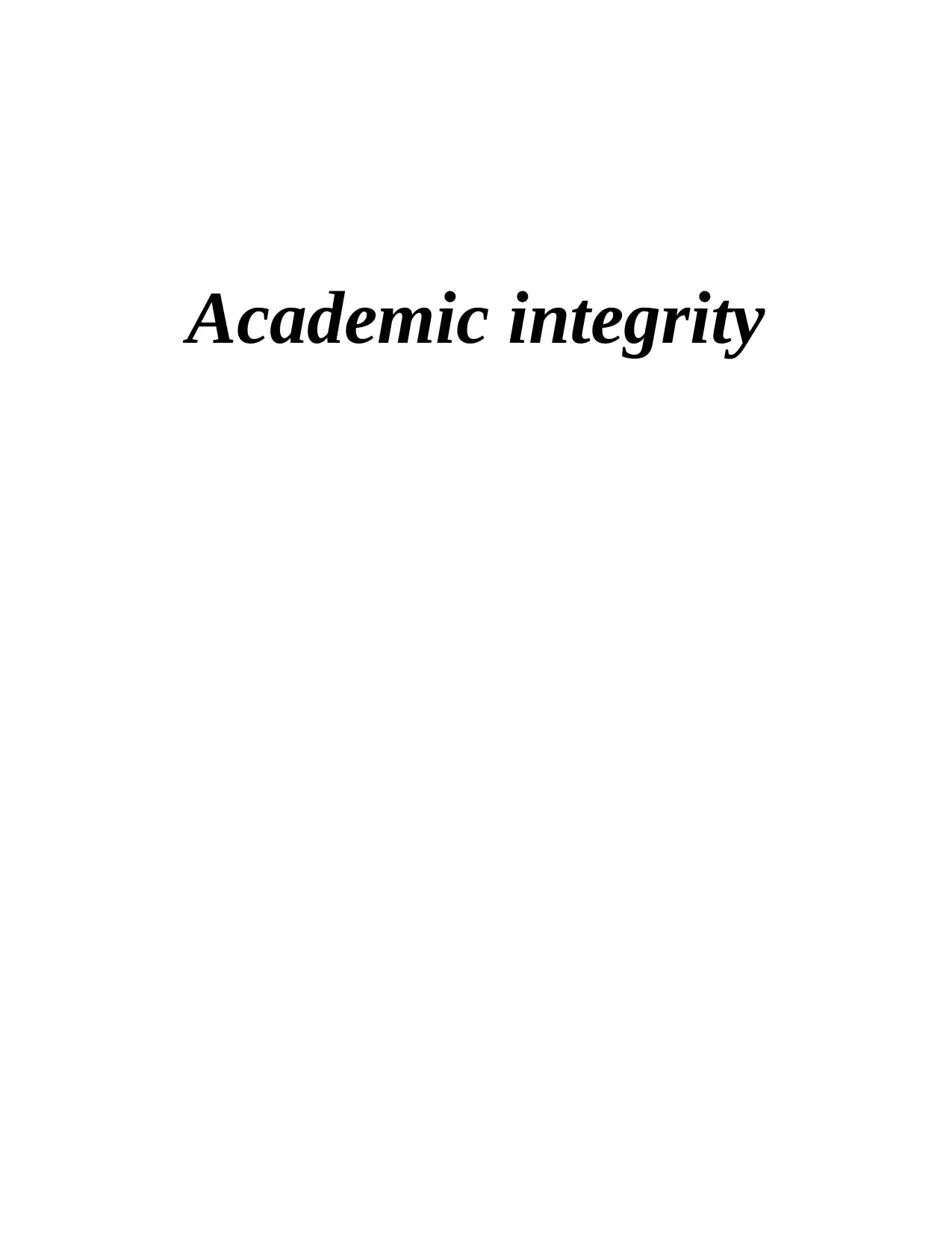
Academic integrity
Secure Best Marks with AI Grader
Need help grading? Try our AI Grader for instant feedback on your assignments.
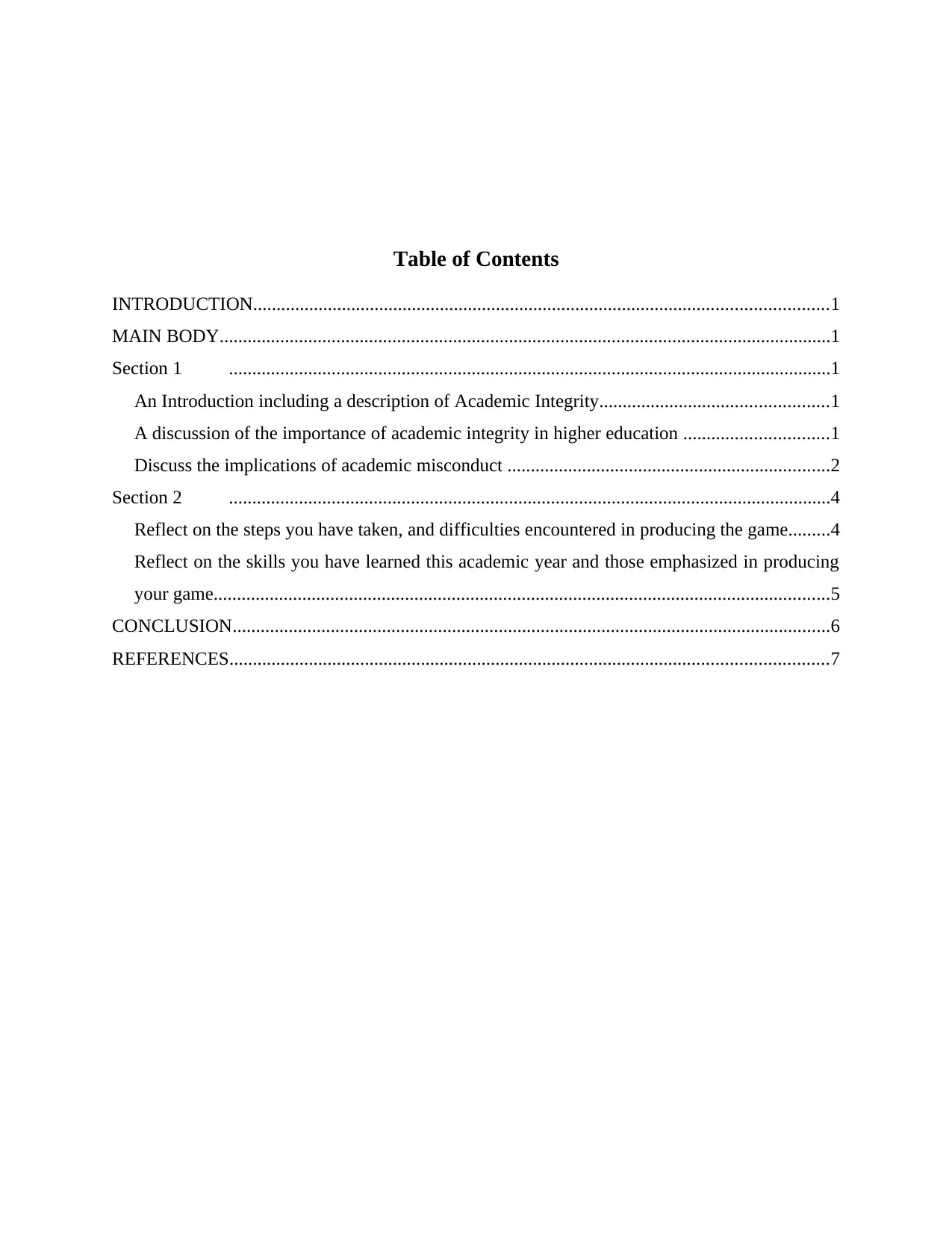
Table of Contents
INTRODUCTION...........................................................................................................................1
MAIN BODY...................................................................................................................................1
Section 1 .................................................................................................................................1
An Introduction including a description of Academic Integrity.................................................1
A discussion of the importance of academic integrity in higher education ...............................1
Discuss the implications of academic misconduct .....................................................................2
Section 2 .................................................................................................................................4
Reflect on the steps you have taken, and difficulties encountered in producing the game.........4
Reflect on the skills you have learned this academic year and those emphasized in producing
your game....................................................................................................................................5
CONCLUSION................................................................................................................................6
REFERENCES................................................................................................................................7
INTRODUCTION...........................................................................................................................1
MAIN BODY...................................................................................................................................1
Section 1 .................................................................................................................................1
An Introduction including a description of Academic Integrity.................................................1
A discussion of the importance of academic integrity in higher education ...............................1
Discuss the implications of academic misconduct .....................................................................2
Section 2 .................................................................................................................................4
Reflect on the steps you have taken, and difficulties encountered in producing the game.........4
Reflect on the skills you have learned this academic year and those emphasized in producing
your game....................................................................................................................................5
CONCLUSION................................................................................................................................6
REFERENCES................................................................................................................................7
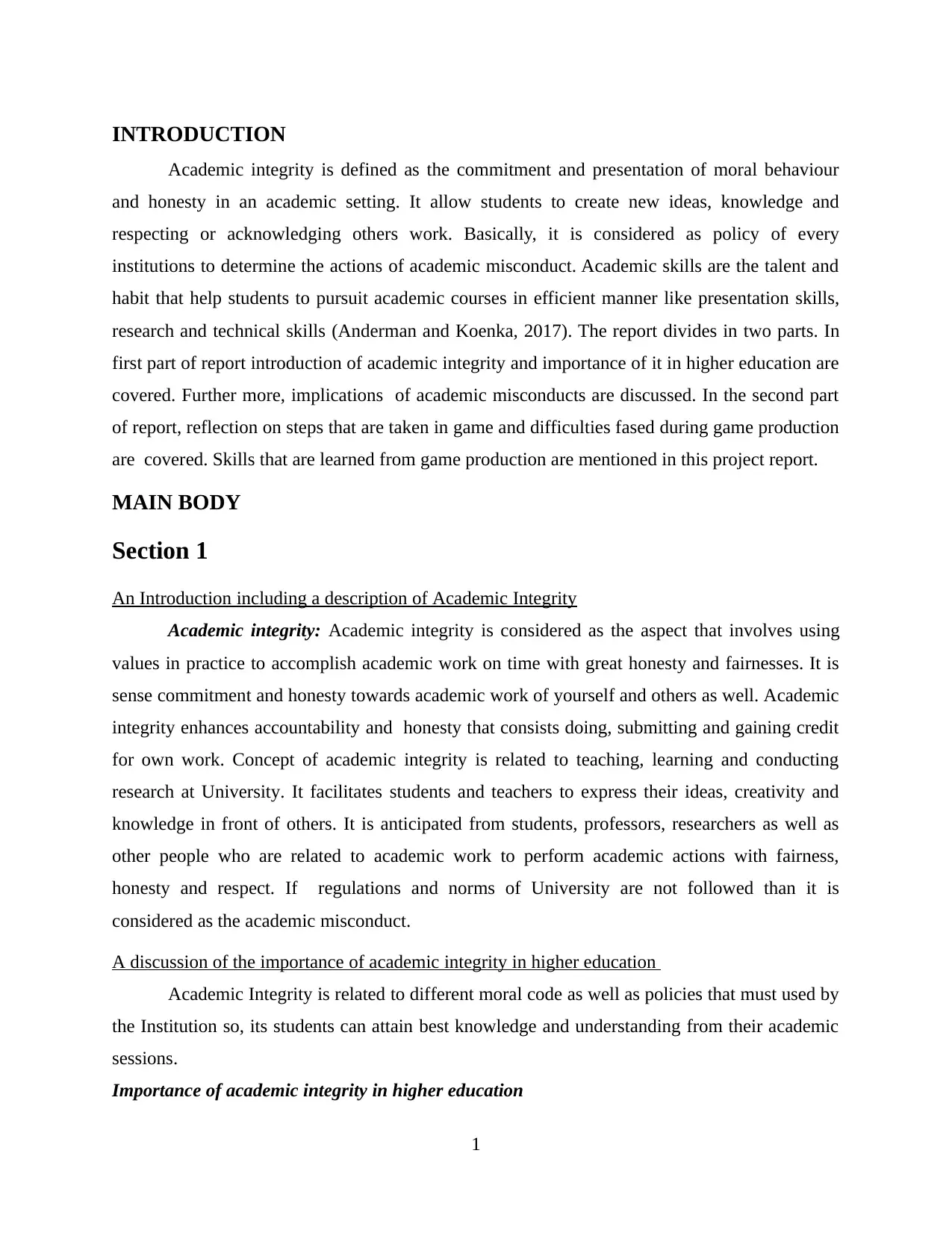
INTRODUCTION
Academic integrity is defined as the commitment and presentation of moral behaviour
and honesty in an academic setting. It allow students to create new ideas, knowledge and
respecting or acknowledging others work. Basically, it is considered as policy of every
institutions to determine the actions of academic misconduct. Academic skills are the talent and
habit that help students to pursuit academic courses in efficient manner like presentation skills,
research and technical skills (Anderman and Koenka, 2017). The report divides in two parts. In
first part of report introduction of academic integrity and importance of it in higher education are
covered. Further more, implications of academic misconducts are discussed. In the second part
of report, reflection on steps that are taken in game and difficulties fased during game production
are covered. Skills that are learned from game production are mentioned in this project report.
MAIN BODY
Section 1
An Introduction including a description of Academic Integrity
Academic integrity: Academic integrity is considered as the aspect that involves using
values in practice to accomplish academic work on time with great honesty and fairnesses. It is
sense commitment and honesty towards academic work of yourself and others as well. Academic
integrity enhances accountability and honesty that consists doing, submitting and gaining credit
for own work. Concept of academic integrity is related to teaching, learning and conducting
research at University. It facilitates students and teachers to express their ideas, creativity and
knowledge in front of others. It is anticipated from students, professors, researchers as well as
other people who are related to academic work to perform academic actions with fairness,
honesty and respect. If regulations and norms of University are not followed than it is
considered as the academic misconduct.
A discussion of the importance of academic integrity in higher education
Academic Integrity is related to different moral code as well as policies that must used by
the Institution so, its students can attain best knowledge and understanding from their academic
sessions.
Importance of academic integrity in higher education
1
Academic integrity is defined as the commitment and presentation of moral behaviour
and honesty in an academic setting. It allow students to create new ideas, knowledge and
respecting or acknowledging others work. Basically, it is considered as policy of every
institutions to determine the actions of academic misconduct. Academic skills are the talent and
habit that help students to pursuit academic courses in efficient manner like presentation skills,
research and technical skills (Anderman and Koenka, 2017). The report divides in two parts. In
first part of report introduction of academic integrity and importance of it in higher education are
covered. Further more, implications of academic misconducts are discussed. In the second part
of report, reflection on steps that are taken in game and difficulties fased during game production
are covered. Skills that are learned from game production are mentioned in this project report.
MAIN BODY
Section 1
An Introduction including a description of Academic Integrity
Academic integrity: Academic integrity is considered as the aspect that involves using
values in practice to accomplish academic work on time with great honesty and fairnesses. It is
sense commitment and honesty towards academic work of yourself and others as well. Academic
integrity enhances accountability and honesty that consists doing, submitting and gaining credit
for own work. Concept of academic integrity is related to teaching, learning and conducting
research at University. It facilitates students and teachers to express their ideas, creativity and
knowledge in front of others. It is anticipated from students, professors, researchers as well as
other people who are related to academic work to perform academic actions with fairness,
honesty and respect. If regulations and norms of University are not followed than it is
considered as the academic misconduct.
A discussion of the importance of academic integrity in higher education
Academic Integrity is related to different moral code as well as policies that must used by
the Institution so, its students can attain best knowledge and understanding from their academic
sessions.
Importance of academic integrity in higher education
1
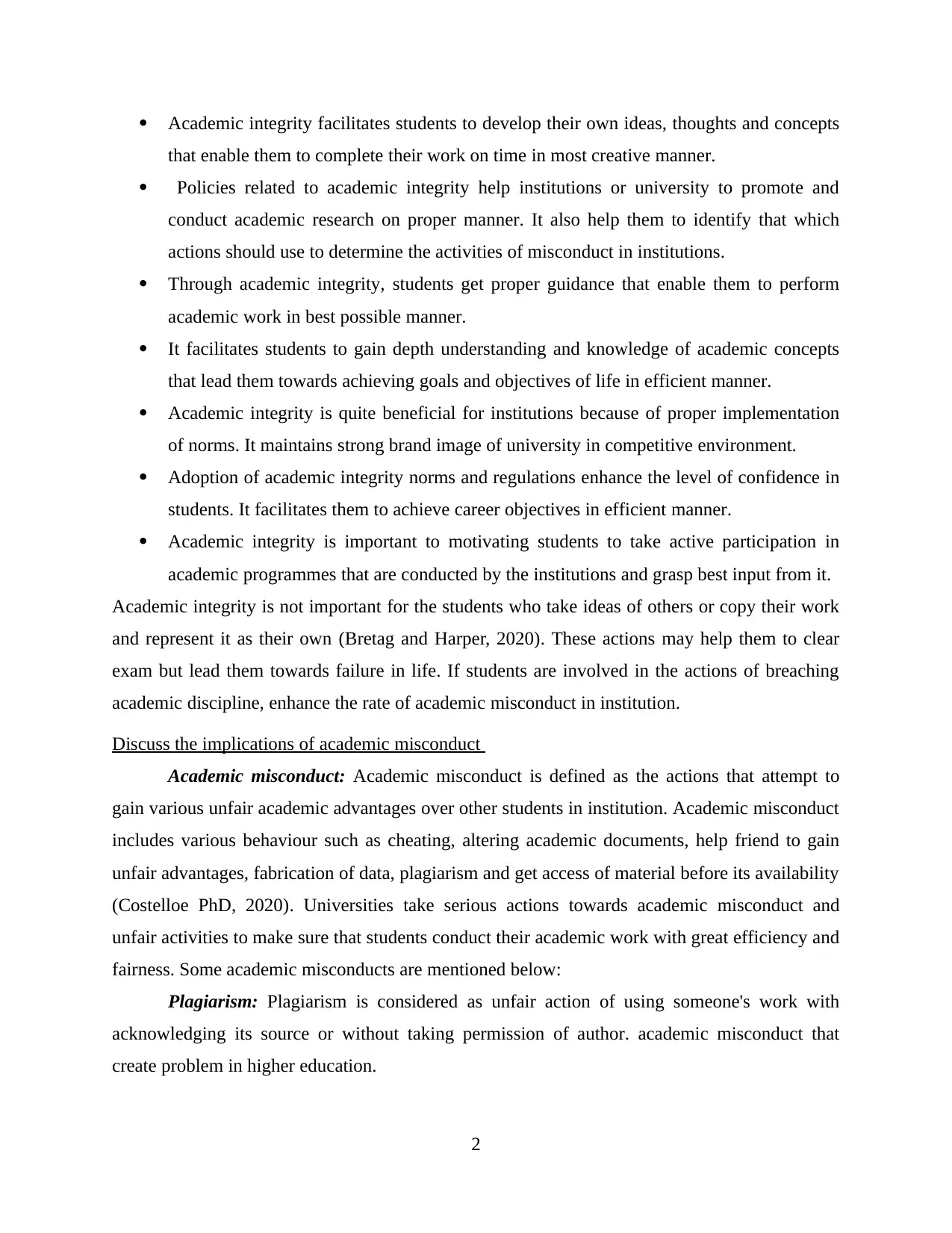
Academic integrity facilitates students to develop their own ideas, thoughts and concepts
that enable them to complete their work on time in most creative manner.
Policies related to academic integrity help institutions or university to promote and
conduct academic research on proper manner. It also help them to identify that which
actions should use to determine the activities of misconduct in institutions.
Through academic integrity, students get proper guidance that enable them to perform
academic work in best possible manner.
It facilitates students to gain depth understanding and knowledge of academic concepts
that lead them towards achieving goals and objectives of life in efficient manner.
Academic integrity is quite beneficial for institutions because of proper implementation
of norms. It maintains strong brand image of university in competitive environment.
Adoption of academic integrity norms and regulations enhance the level of confidence in
students. It facilitates them to achieve career objectives in efficient manner.
Academic integrity is important to motivating students to take active participation in
academic programmes that are conducted by the institutions and grasp best input from it.
Academic integrity is not important for the students who take ideas of others or copy their work
and represent it as their own (Bretag and Harper, 2020). These actions may help them to clear
exam but lead them towards failure in life. If students are involved in the actions of breaching
academic discipline, enhance the rate of academic misconduct in institution.
Discuss the implications of academic misconduct
Academic misconduct: Academic misconduct is defined as the actions that attempt to
gain various unfair academic advantages over other students in institution. Academic misconduct
includes various behaviour such as cheating, altering academic documents, help friend to gain
unfair advantages, fabrication of data, plagiarism and get access of material before its availability
(Costelloe PhD, 2020). Universities take serious actions towards academic misconduct and
unfair activities to make sure that students conduct their academic work with great efficiency and
fairness. Some academic misconducts are mentioned below:
Plagiarism: Plagiarism is considered as unfair action of using someone's work with
acknowledging its source or without taking permission of author. academic misconduct that
create problem in higher education.
2
that enable them to complete their work on time in most creative manner.
Policies related to academic integrity help institutions or university to promote and
conduct academic research on proper manner. It also help them to identify that which
actions should use to determine the activities of misconduct in institutions.
Through academic integrity, students get proper guidance that enable them to perform
academic work in best possible manner.
It facilitates students to gain depth understanding and knowledge of academic concepts
that lead them towards achieving goals and objectives of life in efficient manner.
Academic integrity is quite beneficial for institutions because of proper implementation
of norms. It maintains strong brand image of university in competitive environment.
Adoption of academic integrity norms and regulations enhance the level of confidence in
students. It facilitates them to achieve career objectives in efficient manner.
Academic integrity is important to motivating students to take active participation in
academic programmes that are conducted by the institutions and grasp best input from it.
Academic integrity is not important for the students who take ideas of others or copy their work
and represent it as their own (Bretag and Harper, 2020). These actions may help them to clear
exam but lead them towards failure in life. If students are involved in the actions of breaching
academic discipline, enhance the rate of academic misconduct in institution.
Discuss the implications of academic misconduct
Academic misconduct: Academic misconduct is defined as the actions that attempt to
gain various unfair academic advantages over other students in institution. Academic misconduct
includes various behaviour such as cheating, altering academic documents, help friend to gain
unfair advantages, fabrication of data, plagiarism and get access of material before its availability
(Costelloe PhD, 2020). Universities take serious actions towards academic misconduct and
unfair activities to make sure that students conduct their academic work with great efficiency and
fairness. Some academic misconducts are mentioned below:
Plagiarism: Plagiarism is considered as unfair action of using someone's work with
acknowledging its source or without taking permission of author. academic misconduct that
create problem in higher education.
2
Secure Best Marks with AI Grader
Need help grading? Try our AI Grader for instant feedback on your assignments.
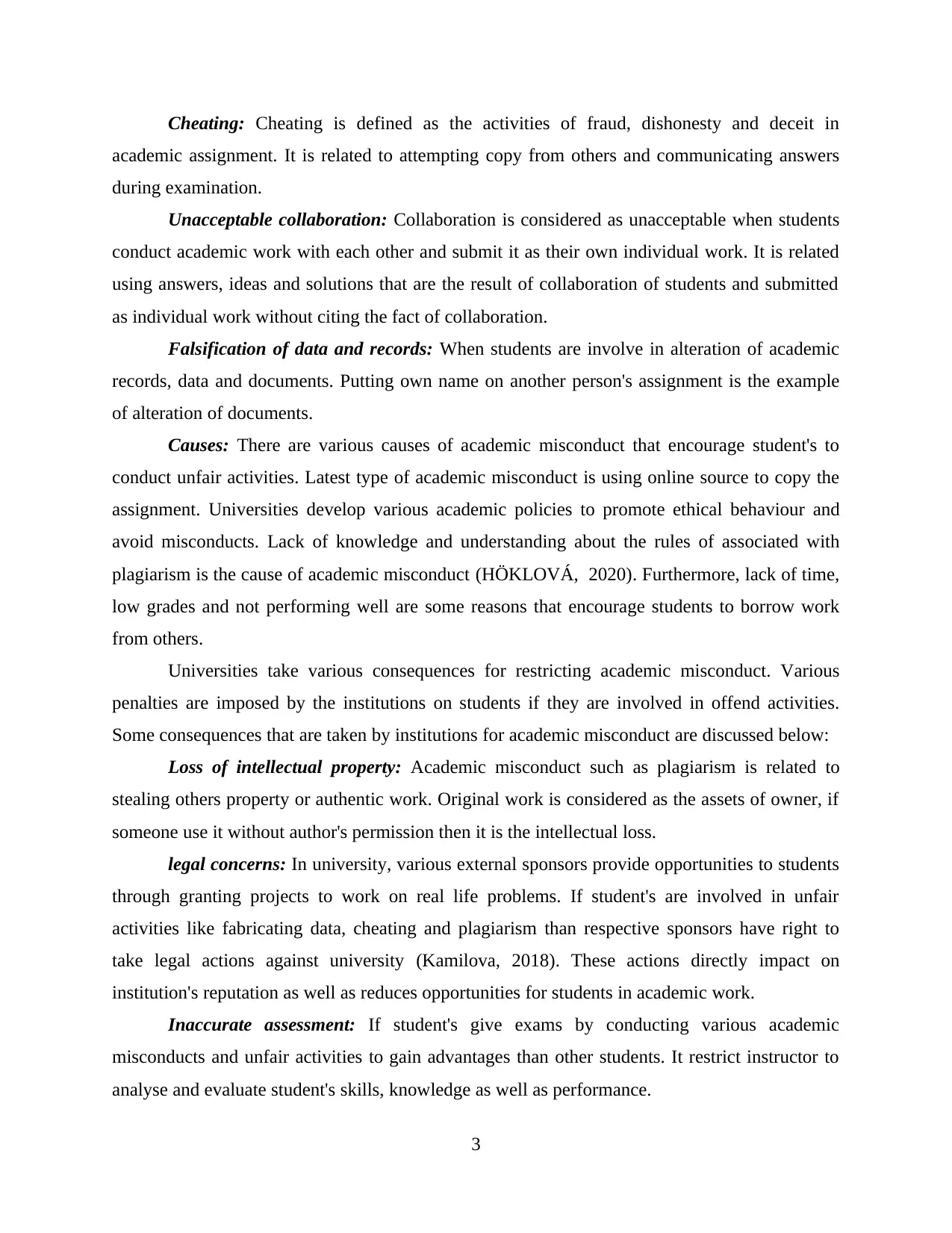
Cheating: Cheating is defined as the activities of fraud, dishonesty and deceit in
academic assignment. It is related to attempting copy from others and communicating answers
during examination.
Unacceptable collaboration: Collaboration is considered as unacceptable when students
conduct academic work with each other and submit it as their own individual work. It is related
using answers, ideas and solutions that are the result of collaboration of students and submitted
as individual work without citing the fact of collaboration.
Falsification of data and records: When students are involve in alteration of academic
records, data and documents. Putting own name on another person's assignment is the example
of alteration of documents.
Causes: There are various causes of academic misconduct that encourage student's to
conduct unfair activities. Latest type of academic misconduct is using online source to copy the
assignment. Universities develop various academic policies to promote ethical behaviour and
avoid misconducts. Lack of knowledge and understanding about the rules of associated with
plagiarism is the cause of academic misconduct (HÖKLOVÁ, 2020). Furthermore, lack of time,
low grades and not performing well are some reasons that encourage students to borrow work
from others.
Universities take various consequences for restricting academic misconduct. Various
penalties are imposed by the institutions on students if they are involved in offend activities.
Some consequences that are taken by institutions for academic misconduct are discussed below:
Loss of intellectual property: Academic misconduct such as plagiarism is related to
stealing others property or authentic work. Original work is considered as the assets of owner, if
someone use it without author's permission then it is the intellectual loss.
legal concerns: In university, various external sponsors provide opportunities to students
through granting projects to work on real life problems. If student's are involved in unfair
activities like fabricating data, cheating and plagiarism than respective sponsors have right to
take legal actions against university (Kamilova, 2018). These actions directly impact on
institution's reputation as well as reduces opportunities for students in academic work.
Inaccurate assessment: If student's give exams by conducting various academic
misconducts and unfair activities to gain advantages than other students. It restrict instructor to
analyse and evaluate student's skills, knowledge as well as performance.
3
academic assignment. It is related to attempting copy from others and communicating answers
during examination.
Unacceptable collaboration: Collaboration is considered as unacceptable when students
conduct academic work with each other and submit it as their own individual work. It is related
using answers, ideas and solutions that are the result of collaboration of students and submitted
as individual work without citing the fact of collaboration.
Falsification of data and records: When students are involve in alteration of academic
records, data and documents. Putting own name on another person's assignment is the example
of alteration of documents.
Causes: There are various causes of academic misconduct that encourage student's to
conduct unfair activities. Latest type of academic misconduct is using online source to copy the
assignment. Universities develop various academic policies to promote ethical behaviour and
avoid misconducts. Lack of knowledge and understanding about the rules of associated with
plagiarism is the cause of academic misconduct (HÖKLOVÁ, 2020). Furthermore, lack of time,
low grades and not performing well are some reasons that encourage students to borrow work
from others.
Universities take various consequences for restricting academic misconduct. Various
penalties are imposed by the institutions on students if they are involved in offend activities.
Some consequences that are taken by institutions for academic misconduct are discussed below:
Loss of intellectual property: Academic misconduct such as plagiarism is related to
stealing others property or authentic work. Original work is considered as the assets of owner, if
someone use it without author's permission then it is the intellectual loss.
legal concerns: In university, various external sponsors provide opportunities to students
through granting projects to work on real life problems. If student's are involved in unfair
activities like fabricating data, cheating and plagiarism than respective sponsors have right to
take legal actions against university (Kamilova, 2018). These actions directly impact on
institution's reputation as well as reduces opportunities for students in academic work.
Inaccurate assessment: If student's give exams by conducting various academic
misconducts and unfair activities to gain advantages than other students. It restrict instructor to
analyse and evaluate student's skills, knowledge as well as performance.
3
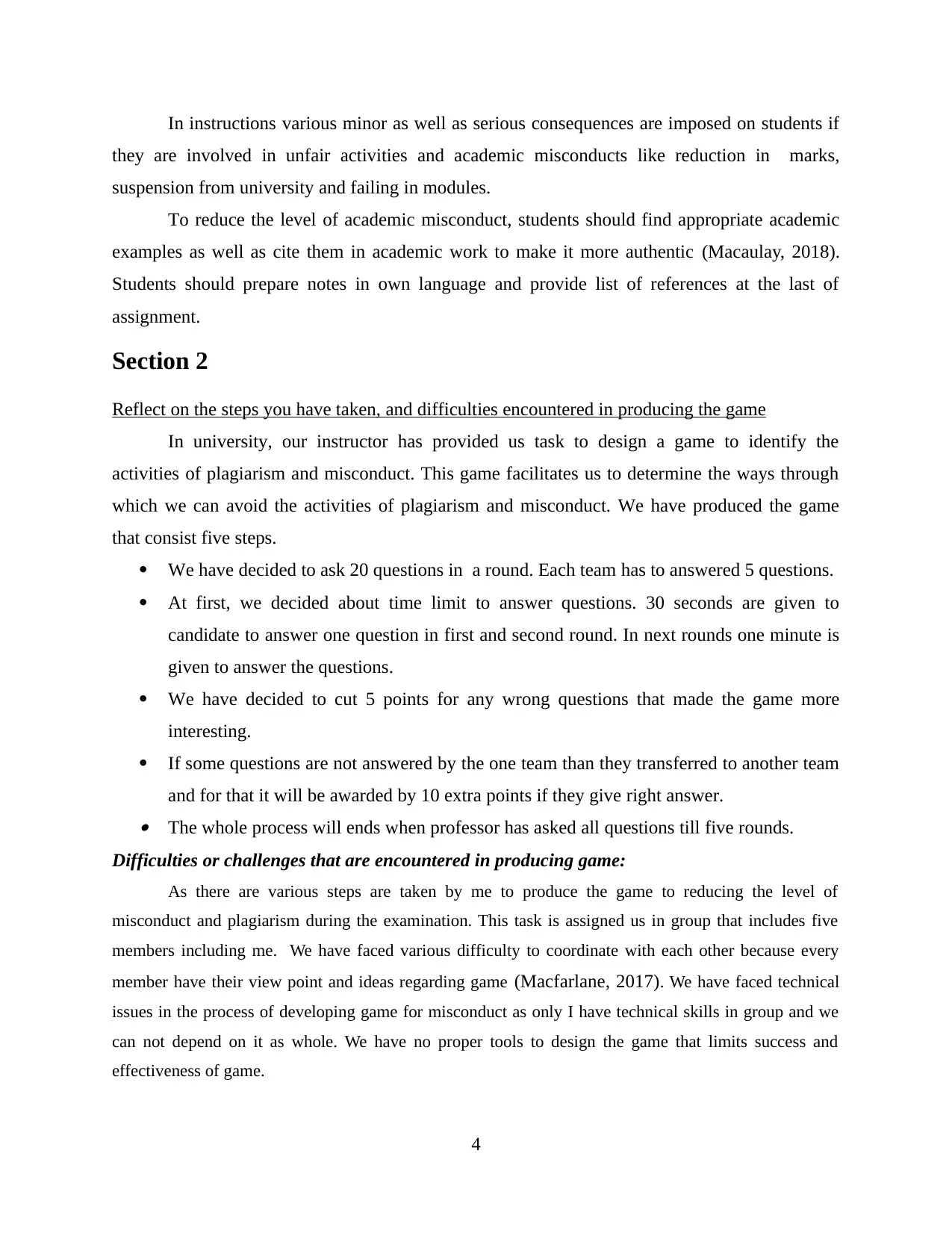
In instructions various minor as well as serious consequences are imposed on students if
they are involved in unfair activities and academic misconducts like reduction in marks,
suspension from university and failing in modules.
To reduce the level of academic misconduct, students should find appropriate academic
examples as well as cite them in academic work to make it more authentic (Macaulay, 2018).
Students should prepare notes in own language and provide list of references at the last of
assignment.
Section 2
Reflect on the steps you have taken, and difficulties encountered in producing the game
In university, our instructor has provided us task to design a game to identify the
activities of plagiarism and misconduct. This game facilitates us to determine the ways through
which we can avoid the activities of plagiarism and misconduct. We have produced the game
that consist five steps.
We have decided to ask 20 questions in a round. Each team has to answered 5 questions.
At first, we decided about time limit to answer questions. 30 seconds are given to
candidate to answer one question in first and second round. In next rounds one minute is
given to answer the questions.
We have decided to cut 5 points for any wrong questions that made the game more
interesting.
If some questions are not answered by the one team than they transferred to another team
and for that it will be awarded by 10 extra points if they give right answer. The whole process will ends when professor has asked all questions till five rounds.
Difficulties or challenges that are encountered in producing game:
As there are various steps are taken by me to produce the game to reducing the level of
misconduct and plagiarism during the examination. This task is assigned us in group that includes five
members including me. We have faced various difficulty to coordinate with each other because every
member have their view point and ideas regarding game (Macfarlane, 2017). We have faced technical
issues in the process of developing game for misconduct as only I have technical skills in group and we
can not depend on it as whole. We have no proper tools to design the game that limits success and
effectiveness of game.
4
they are involved in unfair activities and academic misconducts like reduction in marks,
suspension from university and failing in modules.
To reduce the level of academic misconduct, students should find appropriate academic
examples as well as cite them in academic work to make it more authentic (Macaulay, 2018).
Students should prepare notes in own language and provide list of references at the last of
assignment.
Section 2
Reflect on the steps you have taken, and difficulties encountered in producing the game
In university, our instructor has provided us task to design a game to identify the
activities of plagiarism and misconduct. This game facilitates us to determine the ways through
which we can avoid the activities of plagiarism and misconduct. We have produced the game
that consist five steps.
We have decided to ask 20 questions in a round. Each team has to answered 5 questions.
At first, we decided about time limit to answer questions. 30 seconds are given to
candidate to answer one question in first and second round. In next rounds one minute is
given to answer the questions.
We have decided to cut 5 points for any wrong questions that made the game more
interesting.
If some questions are not answered by the one team than they transferred to another team
and for that it will be awarded by 10 extra points if they give right answer. The whole process will ends when professor has asked all questions till five rounds.
Difficulties or challenges that are encountered in producing game:
As there are various steps are taken by me to produce the game to reducing the level of
misconduct and plagiarism during the examination. This task is assigned us in group that includes five
members including me. We have faced various difficulty to coordinate with each other because every
member have their view point and ideas regarding game (Macfarlane, 2017). We have faced technical
issues in the process of developing game for misconduct as only I have technical skills in group and we
can not depend on it as whole. We have no proper tools to design the game that limits success and
effectiveness of game.
4
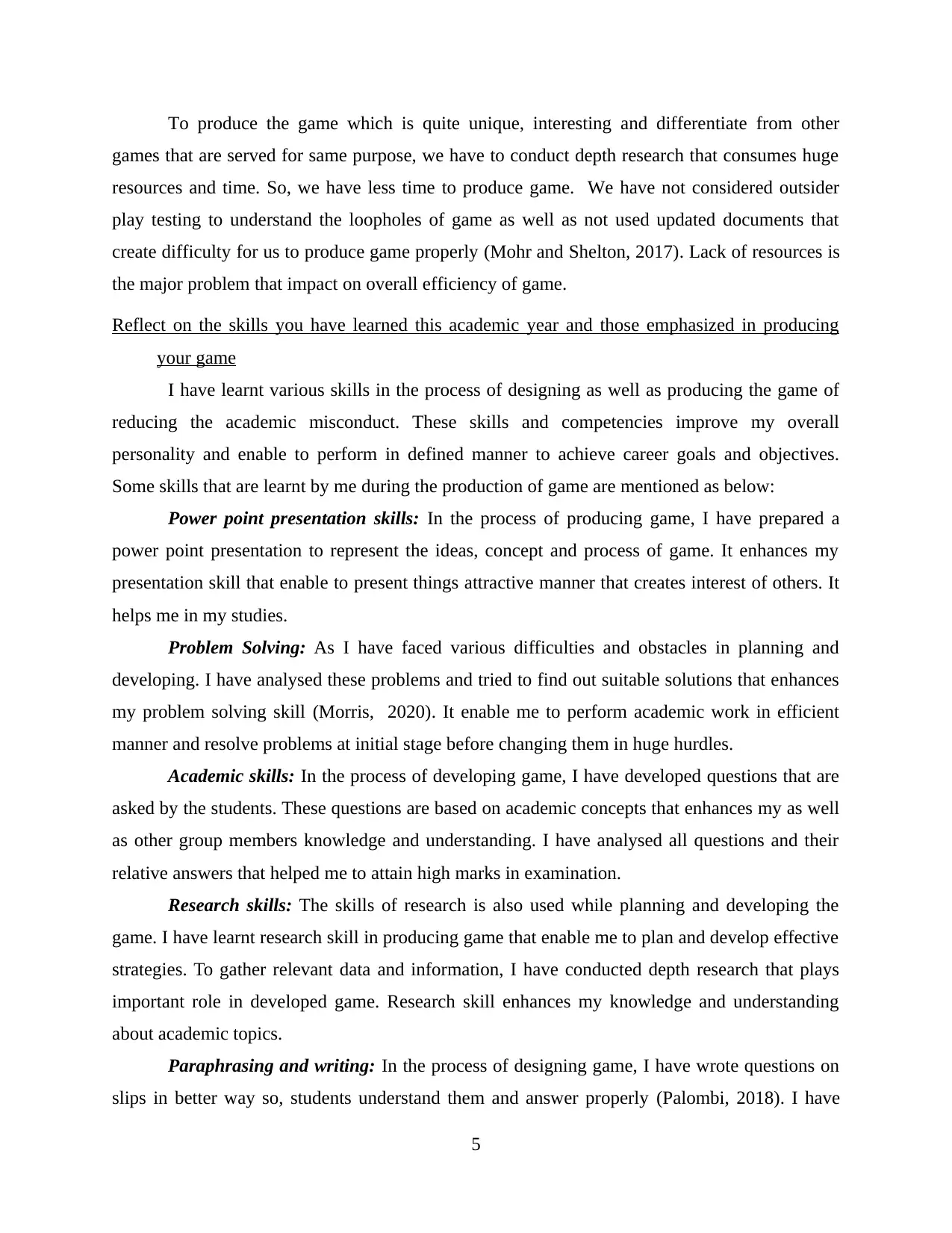
To produce the game which is quite unique, interesting and differentiate from other
games that are served for same purpose, we have to conduct depth research that consumes huge
resources and time. So, we have less time to produce game. We have not considered outsider
play testing to understand the loopholes of game as well as not used updated documents that
create difficulty for us to produce game properly (Mohr and Shelton, 2017). Lack of resources is
the major problem that impact on overall efficiency of game.
Reflect on the skills you have learned this academic year and those emphasized in producing
your game
I have learnt various skills in the process of designing as well as producing the game of
reducing the academic misconduct. These skills and competencies improve my overall
personality and enable to perform in defined manner to achieve career goals and objectives.
Some skills that are learnt by me during the production of game are mentioned as below:
Power point presentation skills: In the process of producing game, I have prepared a
power point presentation to represent the ideas, concept and process of game. It enhances my
presentation skill that enable to present things attractive manner that creates interest of others. It
helps me in my studies.
Problem Solving: As I have faced various difficulties and obstacles in planning and
developing. I have analysed these problems and tried to find out suitable solutions that enhances
my problem solving skill (Morris, 2020). It enable me to perform academic work in efficient
manner and resolve problems at initial stage before changing them in huge hurdles.
Academic skills: In the process of developing game, I have developed questions that are
asked by the students. These questions are based on academic concepts that enhances my as well
as other group members knowledge and understanding. I have analysed all questions and their
relative answers that helped me to attain high marks in examination.
Research skills: The skills of research is also used while planning and developing the
game. I have learnt research skill in producing game that enable me to plan and develop effective
strategies. To gather relevant data and information, I have conducted depth research that plays
important role in developed game. Research skill enhances my knowledge and understanding
about academic topics.
Paraphrasing and writing: In the process of designing game, I have wrote questions on
slips in better way so, students understand them and answer properly (Palombi, 2018). I have
5
games that are served for same purpose, we have to conduct depth research that consumes huge
resources and time. So, we have less time to produce game. We have not considered outsider
play testing to understand the loopholes of game as well as not used updated documents that
create difficulty for us to produce game properly (Mohr and Shelton, 2017). Lack of resources is
the major problem that impact on overall efficiency of game.
Reflect on the skills you have learned this academic year and those emphasized in producing
your game
I have learnt various skills in the process of designing as well as producing the game of
reducing the academic misconduct. These skills and competencies improve my overall
personality and enable to perform in defined manner to achieve career goals and objectives.
Some skills that are learnt by me during the production of game are mentioned as below:
Power point presentation skills: In the process of producing game, I have prepared a
power point presentation to represent the ideas, concept and process of game. It enhances my
presentation skill that enable to present things attractive manner that creates interest of others. It
helps me in my studies.
Problem Solving: As I have faced various difficulties and obstacles in planning and
developing. I have analysed these problems and tried to find out suitable solutions that enhances
my problem solving skill (Morris, 2020). It enable me to perform academic work in efficient
manner and resolve problems at initial stage before changing them in huge hurdles.
Academic skills: In the process of developing game, I have developed questions that are
asked by the students. These questions are based on academic concepts that enhances my as well
as other group members knowledge and understanding. I have analysed all questions and their
relative answers that helped me to attain high marks in examination.
Research skills: The skills of research is also used while planning and developing the
game. I have learnt research skill in producing game that enable me to plan and develop effective
strategies. To gather relevant data and information, I have conducted depth research that plays
important role in developed game. Research skill enhances my knowledge and understanding
about academic topics.
Paraphrasing and writing: In the process of designing game, I have wrote questions on
slips in better way so, students understand them and answer properly (Palombi, 2018). I have
5
Paraphrase This Document
Need a fresh take? Get an instant paraphrase of this document with our AI Paraphraser
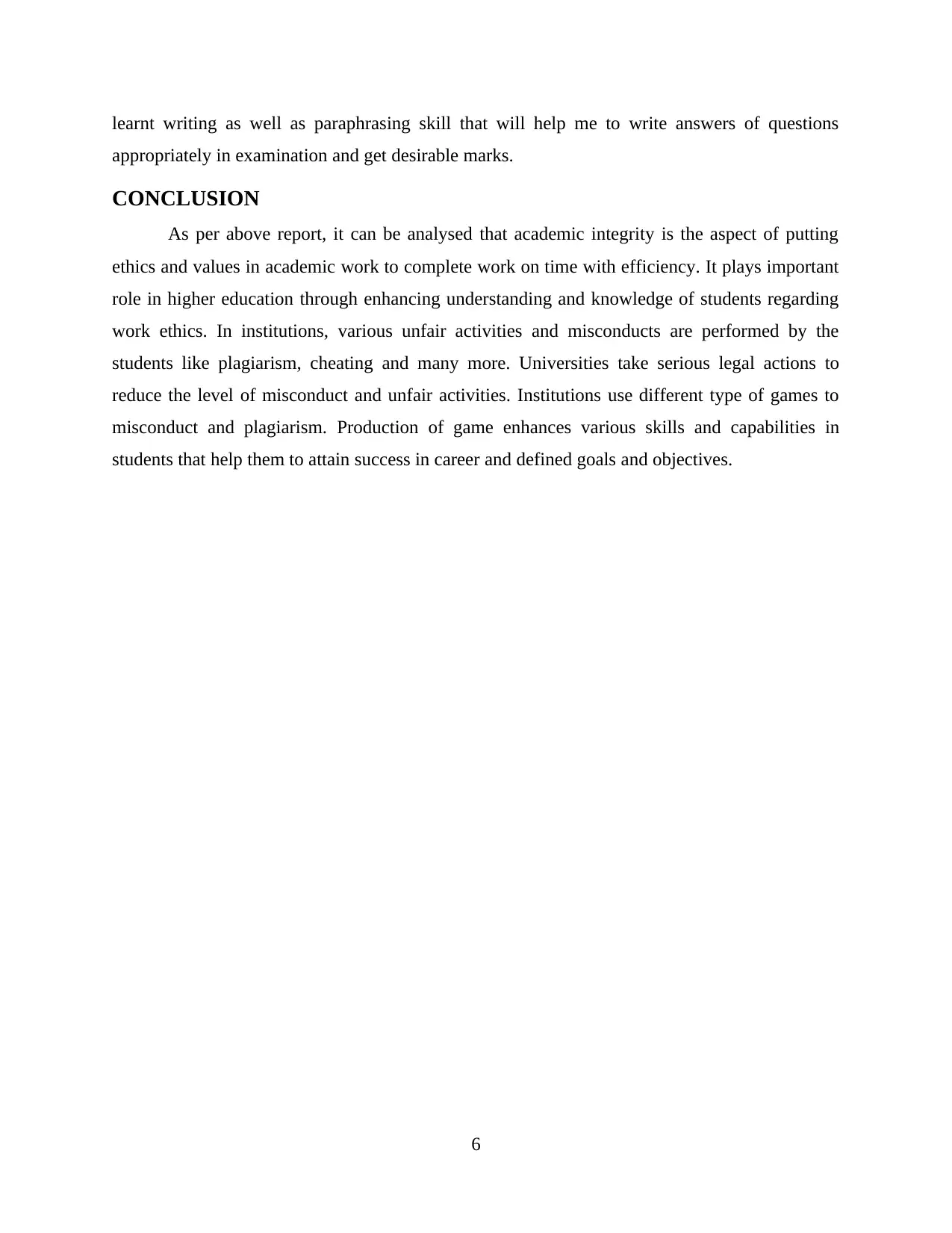
learnt writing as well as paraphrasing skill that will help me to write answers of questions
appropriately in examination and get desirable marks.
CONCLUSION
As per above report, it can be analysed that academic integrity is the aspect of putting
ethics and values in academic work to complete work on time with efficiency. It plays important
role in higher education through enhancing understanding and knowledge of students regarding
work ethics. In institutions, various unfair activities and misconducts are performed by the
students like plagiarism, cheating and many more. Universities take serious legal actions to
reduce the level of misconduct and unfair activities. Institutions use different type of games to
misconduct and plagiarism. Production of game enhances various skills and capabilities in
students that help them to attain success in career and defined goals and objectives.
6
appropriately in examination and get desirable marks.
CONCLUSION
As per above report, it can be analysed that academic integrity is the aspect of putting
ethics and values in academic work to complete work on time with efficiency. It plays important
role in higher education through enhancing understanding and knowledge of students regarding
work ethics. In institutions, various unfair activities and misconducts are performed by the
students like plagiarism, cheating and many more. Universities take serious legal actions to
reduce the level of misconduct and unfair activities. Institutions use different type of games to
misconduct and plagiarism. Production of game enhances various skills and capabilities in
students that help them to attain success in career and defined goals and objectives.
6
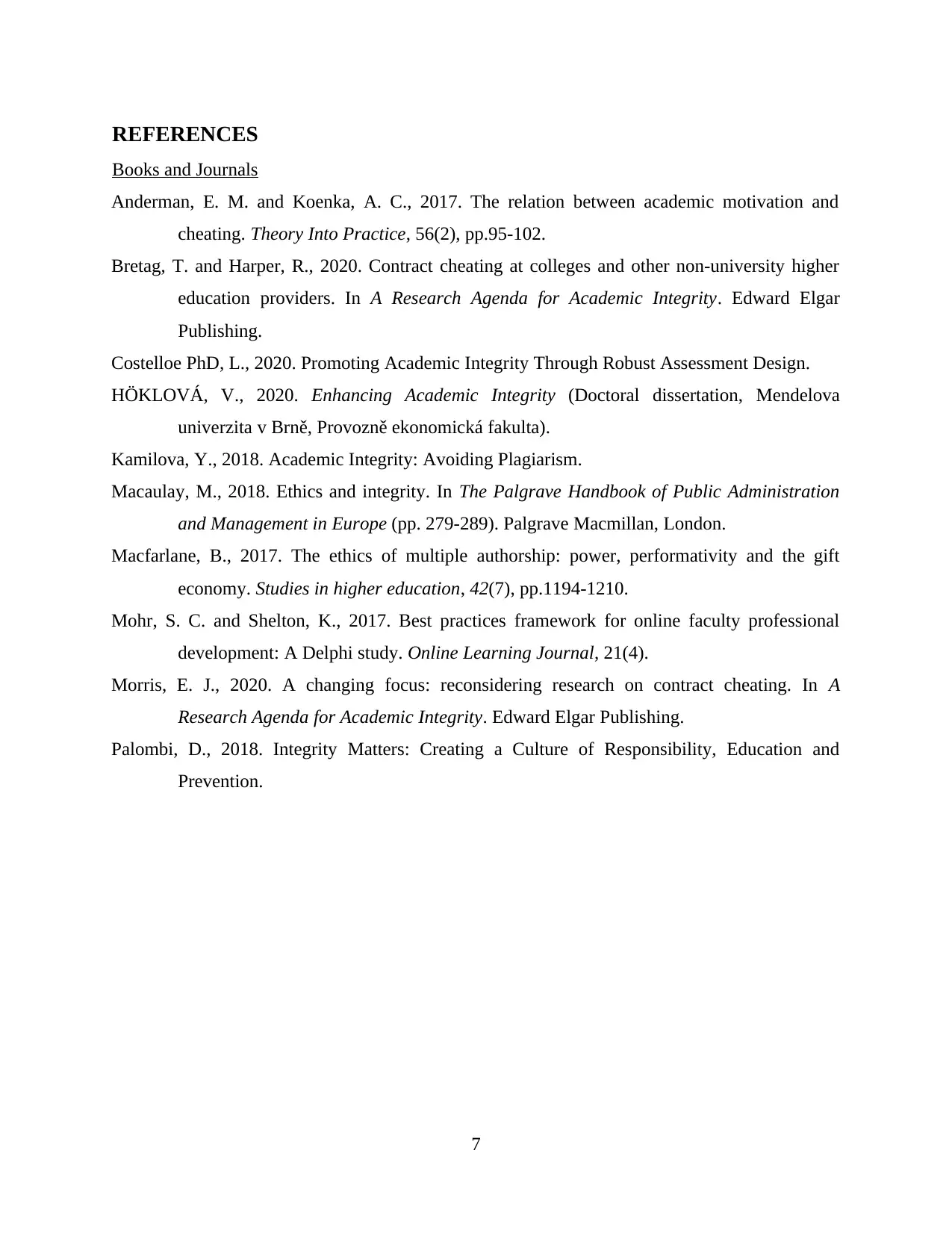
REFERENCES
Books and Journals
Anderman, E. M. and Koenka, A. C., 2017. The relation between academic motivation and
cheating. Theory Into Practice, 56(2), pp.95-102.
Bretag, T. and Harper, R., 2020. Contract cheating at colleges and other non-university higher
education providers. In A Research Agenda for Academic Integrity. Edward Elgar
Publishing.
Costelloe PhD, L., 2020. Promoting Academic Integrity Through Robust Assessment Design.
HÖKLOVÁ, V., 2020. Enhancing Academic Integrity (Doctoral dissertation, Mendelova
univerzita v Brně, Provozně ekonomická fakulta).
Kamilova, Y., 2018. Academic Integrity: Avoiding Plagiarism.
Macaulay, M., 2018. Ethics and integrity. In The Palgrave Handbook of Public Administration
and Management in Europe (pp. 279-289). Palgrave Macmillan, London.
Macfarlane, B., 2017. The ethics of multiple authorship: power, performativity and the gift
economy. Studies in higher education, 42(7), pp.1194-1210.
Mohr, S. C. and Shelton, K., 2017. Best practices framework for online faculty professional
development: A Delphi study. Online Learning Journal, 21(4).
Morris, E. J., 2020. A changing focus: reconsidering research on contract cheating. In A
Research Agenda for Academic Integrity. Edward Elgar Publishing.
Palombi, D., 2018. Integrity Matters: Creating a Culture of Responsibility, Education and
Prevention.
7
Books and Journals
Anderman, E. M. and Koenka, A. C., 2017. The relation between academic motivation and
cheating. Theory Into Practice, 56(2), pp.95-102.
Bretag, T. and Harper, R., 2020. Contract cheating at colleges and other non-university higher
education providers. In A Research Agenda for Academic Integrity. Edward Elgar
Publishing.
Costelloe PhD, L., 2020. Promoting Academic Integrity Through Robust Assessment Design.
HÖKLOVÁ, V., 2020. Enhancing Academic Integrity (Doctoral dissertation, Mendelova
univerzita v Brně, Provozně ekonomická fakulta).
Kamilova, Y., 2018. Academic Integrity: Avoiding Plagiarism.
Macaulay, M., 2018. Ethics and integrity. In The Palgrave Handbook of Public Administration
and Management in Europe (pp. 279-289). Palgrave Macmillan, London.
Macfarlane, B., 2017. The ethics of multiple authorship: power, performativity and the gift
economy. Studies in higher education, 42(7), pp.1194-1210.
Mohr, S. C. and Shelton, K., 2017. Best practices framework for online faculty professional
development: A Delphi study. Online Learning Journal, 21(4).
Morris, E. J., 2020. A changing focus: reconsidering research on contract cheating. In A
Research Agenda for Academic Integrity. Edward Elgar Publishing.
Palombi, D., 2018. Integrity Matters: Creating a Culture of Responsibility, Education and
Prevention.
7
1 out of 9
Related Documents
Your All-in-One AI-Powered Toolkit for Academic Success.
+13062052269
info@desklib.com
Available 24*7 on WhatsApp / Email
![[object Object]](/_next/static/media/star-bottom.7253800d.svg)
Unlock your academic potential
© 2024 | Zucol Services PVT LTD | All rights reserved.


